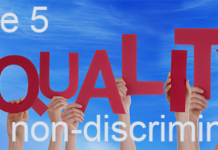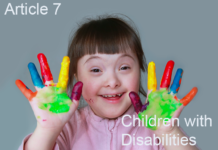Negative attitudes towards disabled people remain a major issue in the UK. Research has found that the majority of UK adults generally believe that disabled people face prejudice in Britain.[1] 38% of people surveyed think disabled people are less productive than non-disabled people and 13% of people surveyed think of disabled people as getting in the way some or most of the time.[2] Viewing disabled people as non-productive members of society is also apparent in that 76% of people surveyed think of disabled people as needing to be cared for.
49% of disabled people report having experienced discrimination in shops and 31% report such behaviour when attending leisure activities, such as cinemas and theatres.[3] Many disabled people experienced other people’s attitudes or behaviours as a problem in challenging areas of their lives. 4% of disabled people responding to the survey said that they had experienced a physical attack in the previous year. About one in six had experienced aggressive or hostile behaviour.[4] In cases of disability-related harassment, negative attitudes are responsible for 72,000 incidents of disability hate crime per year.[5]
Negative portrayals of disabled people in the media, including an increase in articles in the print media that portray disabled people being a burden on the economy may reinforce how the general public feel and act towards disabled people,[6] with research from 2012 demonstrating deteriorating attitudes towards disabled people who are benefits recipients.[7] In 2012 the Leveson Inquiry was launched to look at press behaviour. The submissions to the Inquiry on the negative reporting of disabled people outnumbered those of any other equality group. The 2,000 pages of the final report hid issues of disability, but criticised reporting of the Employment and Support Allowance in three newspapers for providing statistics that said 75% of those applying for it were doing so fraudulently as they were fit for work.
The Government Treasury department opened a heavily publicised and marketed web site for suggestions from the public on how money could be saved in 2010. This web site, which was apparently un-moderated, allowed various comments suggesting that all disabled people, should be sterilised, sent to war and/or sacrificed in different ways, along with various other vicious comments. These were not removed, nor did anyone from the Treasury department apologise, suggesting that such comments were perfectly acceptable and even condoned on a Government web-site[8].
There have been no public awareness raising campaigns to promote positive acceptance of sign language and Deaf culture. Signed broadcasts are mainly during the middle of the night or on digital rather than terrestrial television, and there was no broadcast BSL-English interpreting at the Olympic and paralympic games
[1] OPM and Ipsos MORI (2014) Removing barriers, raising living standards, Report for Scope.
[2] Scope analysis of Opinium research.
[3] ComRes poll, Survey of Disabled People (2011) http://www.comres.co.uk/poll/526/scope-tracker-survey-of-disabled-people.htm
[4] OPM and Ipsos MORI (2014) Removing barriers, raising living standards, Report for Scope.
[5] Coleman N. Sykes W. and Walker A. (2013) Crime and disabled people. Baseline statistical analysis of measures from the formal legal inquiry into disability-related harassment, Equality and Human Rights Commission Research report 90.
[6] Strathclyde Centre for Disability Research and Glasgow Media Unit (2011) Bad news for disabled people: how the newspapers are reporting disability. http://www.gla.ac.uk/media/media_214917_en.pdf
[7] NatCen (2012) British Social Attitudes 29. London: NaCen. http://www.bsa-29.natcen.ac.uk/read-the-report/key-findings/what-do-citizens-want-from-the-state.aspx
[8] http://www.theguardian.com/commentisfree/2012/may/08/leveson-willful-blindness-disabled-people



